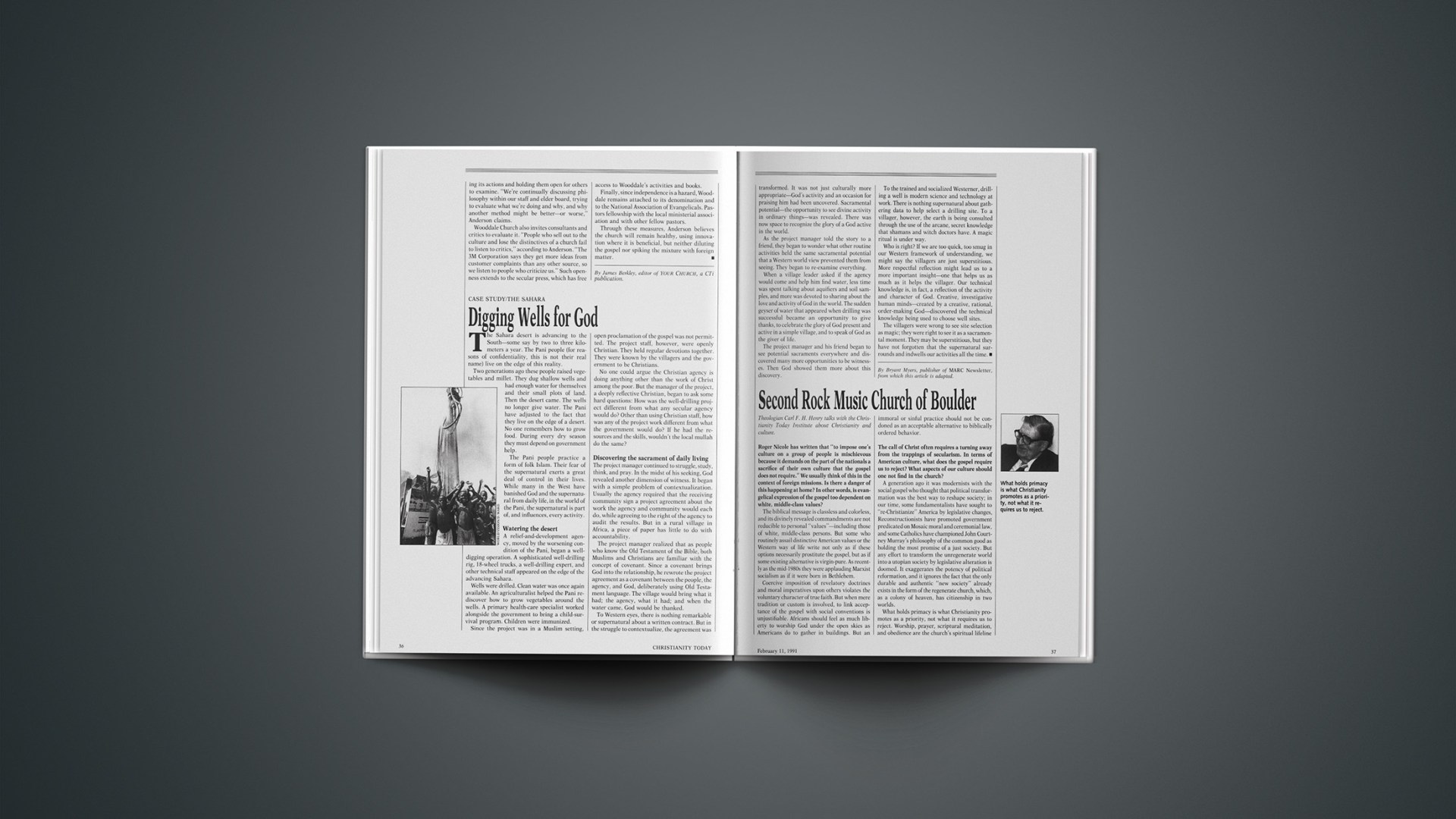The Sahara desert is advancing to the South—some say by two to three kilometers a year. The Pani people (for reasons of confidentiality, this is not their real name) live on the edge of this reality.
Two generations ago these people raised vegetables and millet. They dug shallow wells and had enough water for themselves and their small plots of land. Then the desert came. The wells no longer give water. The Pani have adjusted to the fact that they live on the edge of a desert. No one remembers how to grow food. During every dry season they must depend on government help.
The Pani people practice a form of folk Islam. Their fear of the supernatural exerts a great deal of control in their lives. While many in the West have banished God and the supernatural from daily life, in the world of the Pani, the supernatural is part of, and influences, every activity.
Watering The Desert
A relief-and-development agency, moved by the worsening condition of the Pani, began a well-digging operation. A sophisticated well-drilling rig, 18-wheel trucks, a well-drilling expert, and other technical staff appeared on the edge of the advancing Sahara.
Wells were drilled. Clean water was once again available. An agriculturalist helped the Pani rediscover how to grow vegetables around the wells. A primary health-care specialist worked alongside the government to bring a child-survival program. Children were immunized.
Since the project was in a Muslim setting, open proclamation of the gospel was not permitted. The project staff, however, were openly Christian. They held regular devotions together. They were known by the villagers and the government to be Christians.
No one could argue the Christian agency is doing anything other than the work of Christ among the poor. But the manager of the project, a deeply reflective Christian, began to ask some hard questions: How was the well-drilling project different from what any secular agency would do? Other than using Christian staff, how was any of the project work different from what the government would do? If he had the resources and the skills, wouldn’t the local mullah do the same?
Discovering The Sacrament Of Daily Living
The project manager continued to struggle, study, think, and pray. In the midst of his seeking, God revealed another dimension of witness. It began with a simple problem of contextualization. Usually the agency required that the receiving community sign a project agreement about the work the agency and community would each do, while agreeing to the right of the agency to audit the results. But in a rural village in Africa, a piece of paper has little to do with accountability.
The project manager realized that as people who know the Old Testament of the Bible, both Muslims and Christians are familiar with the concept of covenant. Since a covenant brings God into the relationship, he rewrote the project agreement as a covenant between the people, the agency, and God, deliberately using Old Testament language. The village would bring what it had; the agency, what it had; and when the water came, God would be thanked.
To Western eyes, there is nothing remarkable or supernatural about a written contract. But in the struggle to contextualize, the agreement was transformed. It was not just culturally more appropriate—God’s activity and an occasion for praising him had been uncovered. Sacramental potential—the opportunity to see divine activity in ordinary things—was revealed. There was now space to recognize the glory of a God active in the world.
As the project manager told the story to a friend, they began to wonder what other routine activities held the same sacramental potential that a Western world view prevented them from seeing. They began to re-examine everything.
When a village leader asked if the agency would come and help him find water, less time was spent talking about aquifiers and soil samples, and more was devoted to sharing about the love and activity of God in the world. The sudden geyser of water that appeared when drilling was successful became an opportunity to give thanks, to celebrate the glory of God present and active in a simple village, and to speak of God as the giver of life.
The project manager and his friend began to see potential sacraments everywhere and discovered many more opportunities to be witnesses. Then God showed them more about this discovery.
To the trained and socialized Westerner, drilling a well is modern science and technology at work. There is nothing supernatural about gathering data to help select a drilling site. To a villager, however, the earth is being consulted through the use of the arcane, secret knowledge that shamans and witch doctors have. A magic ritual is under way.
Who is right? If we are too quick, too smug in our Western framework of understanding, we might say the villagers are just superstitious. More respectful reflection might lead us to a more important insight—one that helps us as much as it helps the villager. Our technical knowledge is, in fact, a reflection of the activity and character of God. Creative, investigative human minds—created by a creative, rational, order-making God—discovered the technical knowledge being used to choose well sites.
The villagers were wrong to see site selection as magic; they were right to see it as a sacramental moment. They may be superstitious, but they have not forgotten that the supernatural surrounds and indwells our activities all the time.
By Bryant Myers, publisher of MARC Newsletter, from which this article is adapted.










